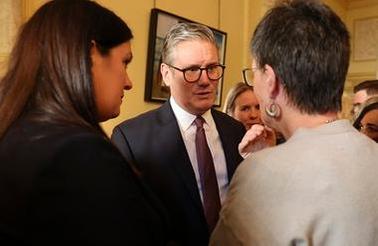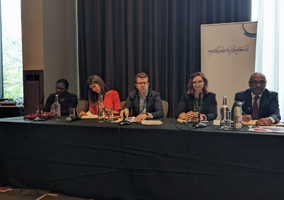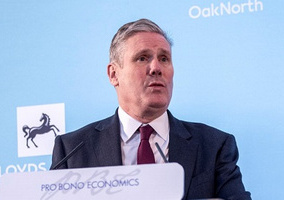Prime minister Keir Starmer has announced plans for a “fundamental reset” as the government publishes a framework for a new working relationship with civil society.
Last month, NCVO chief executive Sarah Elliott revealed that a new agreement between the government and charity sector was due to be published in 2025.
Now, the government has published four key principles that it intends to form the basis of the Civil Society Covenant: transparency, recognition, participation and partnership.
Culture secretary Lisa Nandy today hosted a roundtable discussion at Number 10 Downing Street with civil society representatives from all four UK nations to discuss the plans followed by a reception with Starmer.
The government said a period of engagement throughout the autumn will follow, with aims to include charities of all purposes, sizes, geographical locations and demographic focus.
Further consultations are set to take place across the devolved governments, arm’s length bodies and local authorities, with the final Covenant to be published next year.
NCVO has asked charities to share their views by 12 December.
Government to work ‘hand-in-hand’ with charities
Starmer said: “To fix the foundations of our country we need a fundamental reset of the relationship between government and civil society.
“That is why we’re building a new partnership with the sector to tackle the complex social and economic challenges we face as a country.
“By harnessing the dynamism, innovation and trusted reach of civil society organisations, we can boost growth and deliver better outcomes for communities right across the country.”
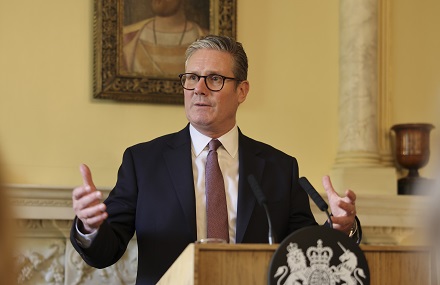
Nandy said: “The Covenant paves the way for a new era in the relationship between government and civil society — one that recognises the critical role the sector plays as a trusted partner in achieving shared goals for the benefit of communities across the UK.
“Voluntary organisations, charities and social enterprises all understand the challenges being faced every day in our villages, towns and cities and the government wants to work hand-in-hand with them to help fix them — changing lives for the better.”
‘Foundational moment’
NCVO and ACEVO, which have been working with the government on the Covenant, welcomed today’s meeting and the government’s commitment to partnership with the sector.
Elliott said: “We are proud to be working with the government on the Civil Society Covenant.
“This foundational moment resets the relationship between government and civil society, ensuring the expertise of charities and social enterprises are central to decision-making.
“We look forward to continuing our work with partners across the sector to achieve this vision.”
ACEVO chief executive Jane Ide said: “ACEVO welcomes the government’s commitment to work together to develop a Civil Society Covenant which aims to redefine our relationship for the benefit of the people, causes and communities we serve.
“Effective leadership relies on collaboration, trust, and mutual respect – values that underpin this Covenant.
“Civil society leaders are essential partners in realising this vision and ensuring its principles are upheld.”
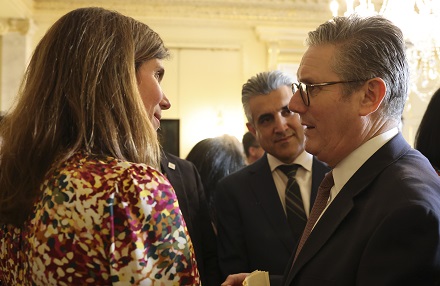
‘Long overdue’
Voice4Change England director Kunle Olulode said: “It is long overdue for the government to engage seriously with the parts of the Black and minoritised third sector we are involved in, so we are keen to make it work.
“We look forward to constructive, meaningful engagement and positive changes for all in British Society.”
Wales Council for Voluntary Action chief executive Lindsay Cordery-Bruce said: “We welcome the new Covenant as the next step in the civil society movement across the UK.
“A new Covenant that complements the existing arrangements in the devolved nations will offer an opportunity to build on good practice.”
National Association for Voluntary and Community Action CEO Maddy Desforges said: “We welcome government’s explicit recognition of the VCSE’s role in tackling complex and deep-rooted societal problems.
“Local VCSE support organisations form critical connections between the VCSE and statutory partners and capture communities’ unique knowledge and problem-solving insights.”
Locality CEO Tony Armstrong said: “We see every day what community power can achieve, and the support of government at all levels will allow community organisations to do even more to help local people thrive.”
Refugee Council CEO Enver Solomon said: “It is very encouraging to have a government firmly committed to reaching a new deal on how it works with the voluntary sector as it responds to the huge challenges society and public services face.
“Charities bring years of invaluable frontline experience, service innovation and an independent perspective that can make government policy and delivery stronger and grounded in the reality of people's lived experience.”
Neil Heslop, chief executive of the Charities Aid Foundation, said: “It is positive that the government appreciates the vital role charities undertake and are announcing the start of a partnership approach with civil society to address our most pressing issues.
“Charities have been through very tough times, and we look forward to working with the government to build a more resilient and thriving civil society in the coming years.”
Charity Commission chief executive David Holdsworth, said: “The proposed new Civil Society Covenant is a welcome initiative to set out some clear principles for how the government and charity sector can work more effectively together to tackle some of the biggest challenges facing society, whilst ensuring charities remain independent of the state and non-party political.
“We encourage charities to engage in the consultation, to help shape a mature and trusting cooperation between the two for the future.”
Related articles



